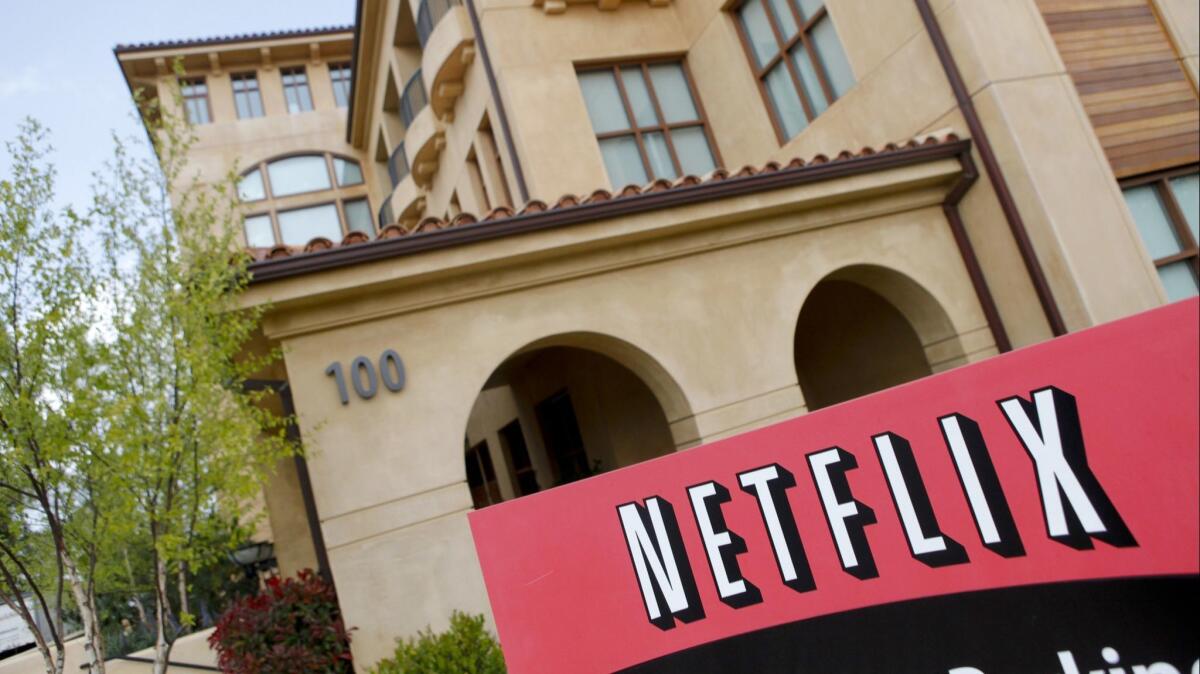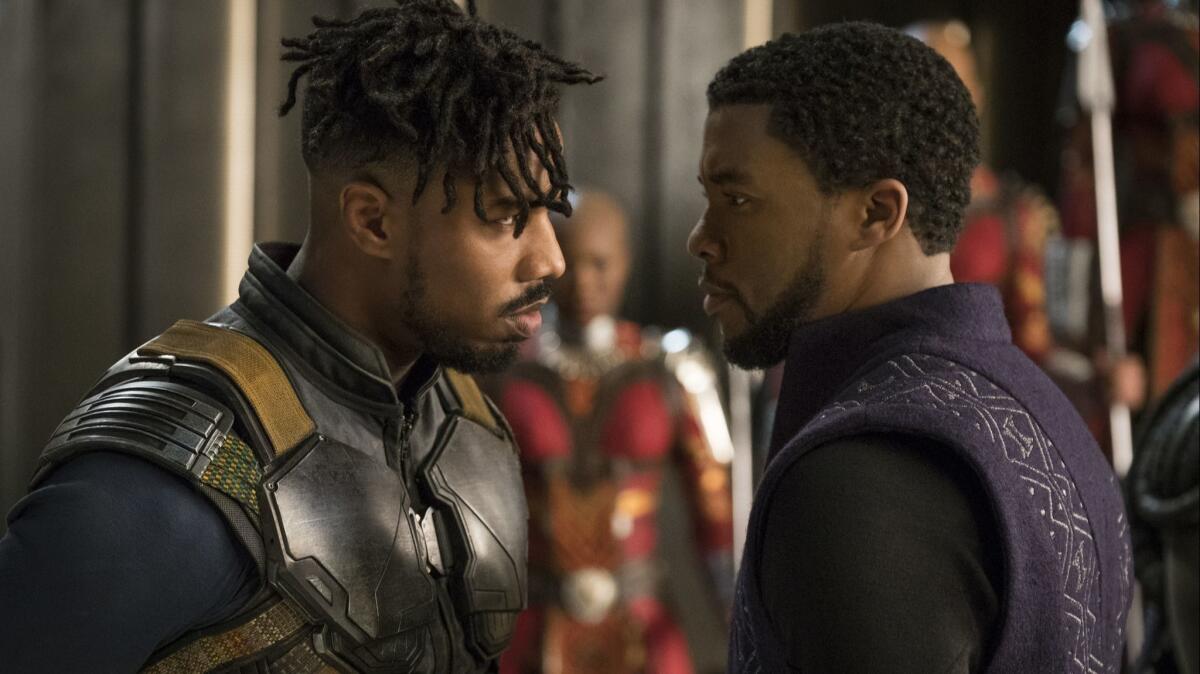Hollywood studios can’t quit Netflix — even if they want to

Hollywood studios say they’re breaking up with Netflix. But the reality isn’t that simple.
Two years ago, Walt Disney Co. parted ways with Netflix Inc. in a public declaration of war. The owner of “Star Wars,” Marvel and Pixar movies would stop licensing films to the world’s most popular paid online TV network. Instead, Disney planned to keep them for its own streaming services.
Yet the media giant left out a key detail: Under their current deal, every movie released between January 2016 and December 2018 — including epics such as “Black Panther” — will be back on Netflix starting around 2026, people familiar with the matter said.
Similar issues confront other media titans such as NBCUniversal and AT&T Inc., the owner of HBO and Warner Bros. Netflix, which has about 150 million subscribers worldwide, has some of their most-popular shows locked up for years.
“There has been no universal pullback,” said Michael Nathanson, an analyst at investor research firm MoffettNathanson.
Much has been made in recent weeks about the prospect of Netflix losing popular programs such as “Friends” and “The Office” as the owners of those shows — AT&T and Comcast Corp.’s NBC, respectively — plot their own online moves and debate whether to keep supplying programs. Netflix has used their shows and movies to upend pay TV and build a streaming business that investors value at more than $150 billion. Netflix bears have pointed to the risks of the company losing popular content.
But like Disney, the companies that own Netflix shows are bound by deals they made a long time ago, said the people, who asked not to be identified discussing nonpublic information.

Of the 10 most popular licensed programs on Netflix, at least eight will be on the streaming service for years to come, according to the people. “Grey’s Anatomy,” “The Walking Dead” and a slate of shows from the CW network, including “Riverdale” and “Supernatural,” will stay on Netflix for as long as they remain on the air — and then for three to six years after that, said the people. That means they will be on Netflix until at least 2023, and probably well past that.
And when the big Marvel, “Star Wars” and Pixar films return to Netflix in a few years, they’ll disappear from Disney’s own online service, according to the people.
Disney began licensing movies to Netflix in 2012, four years after the streaming service gained access to 2,500 movies through an arrangement with the Starz cable network. Hollywood studios saw Netflix as a lucrative way to replace shrinking DVD sales. Nickelodeon, Warner Bros., Fox and others all cashed in as well, handing Netflix some of their most popular programs. Many doubted the long-term viability of Netflix, so the agreements may not have seemed like much of a gamble at the time.
But their shows were a boon for Netflix’s nascent streaming service, which had a small library of old movies when it debuted in 2007. Reruns of popular TV hits are a perennial draw and the foundation of the programming lineups at networks such as TBS and Comedy Central. Netflix operated online for five years before releasing its first original series, building its audience with thousands of shows owned by other companies.
Netflix’s library of other companies’ shows was so exhaustive that, ahead of the company’s 2013 debut in Britain, Kasey Moore started a website just to track what shows were coming onto and off of the service every month. Moore called the website What’s on Netflix, and it now gets 4.5 million visitors a month.
“You’ve got thousands of titles in the Netflix library,” Moore said in an interview. “It just made sense for someone to track it all.”
As early as 2011, studios started to worry that Netflix was damaging their businesses. The company surpassed 20 million customers online, and TV viewership among young people was in decline. But they couldn’t turn down the money. Disney was expected to bank more than $350 million a year by licensing Netflix the rights to offer its movies after they left theaters, according to analysts’ estimates at the time.
Those concerns have intensified as traditional TV viewing continues to sputter and Netflix continues to grow. And now the world’s largest media companies are rushing to build their own online services. Disney will unveil Disney+ in November, followed by offerings from AT&T and NBCUniversal. All of them are assessing what shows they will need to attract subscribers.
“We are going to have to take a lot of the great content we own that’s been licensed elsewhere and bring that back into the fold,” AT&T Chief Executive Randall Stephenson said at a May investor conference.
Just one problem: AT&T, which bought Time Warner for $85 billion last year, has a lot of its film and TV content tied up with Netflix and others. Warner Bros. is the biggest TV producer in Hollywood and has built its business licensing shows to third parties.
Under AT&T, it will reserve some for a new streaming service but will continue to sell programs to Netflix, Amazon.com Inc. and Disney’s Hulu, according to several people familiar with its plans. The home of “Friends” and “The Big Bang Theory” counts too much on such sales to forgo third-party deals.
NBCUniversal is thinking similarly. The company could keep “The Office” for its upcoming streaming service, but it has held talks with Netflix, Hulu, Amazon and AT&T about selling the rights. Even if NBCUniversal decides to keep the show for itself, it will still be licensing shows such as “The Good Place” to Netflix.
Meanwhile, Netflix has been producing more shows on its own. The company will have 1,000-plus pieces of original programming this year, and that is projected to triple in a few years as its worldwide subscriber base continues to grow.
“People are missing it,” Nathanson said. “The loss of back titles will not kill Netflix or slow subscriber growth. It just forces them to make more original content.”






